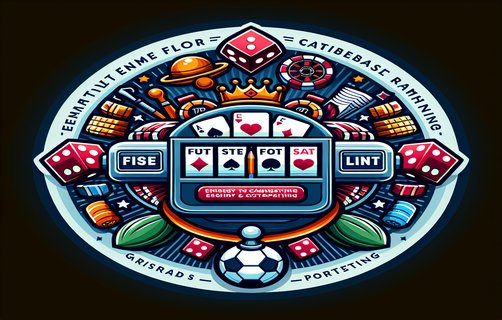Mastering the Art of Betting: An In-Depth Exploration of Poker Strategies
पॉकर रणनीतियों का एक गहन विश्लेषण
In the complex world of poker, the ability to maintain a poker face goes hand in hand with strategic thinking and calculated risks. Understanding factors like fund allocation, bet profitability, and long-term goal focus is crucial for anyone looking to make a mark in this game. This analysis delves into these elements, providing insight into the sophisticated strategies that lead to success.

Fund allocation is one of the first aspects to consider. Allocating your funds wisely involves determining how much of your bankroll can be used for each betting session without putting excessive pressure on your finances. A common rule of thumb suggests allocating no more than 5% of your total bankroll to any single tournament or game. This approach minimizes risk and allows players to absorb losses without jeopardizing their ability to play.
Bet profitability is another key aspect to examine. Each bet should be evaluated based on its potential return versus the risk involved. Players often use pot odds to inform their decision-making, which involves comparing the current size of the pot to the cost of a contemplated call. This analysis helps players to identify whether a bet is profitable in the long run. Moreover, players should also assess their opponents’ betting patterns to gauge whether certain bets might yield higher returns depending on how others react.
Long-term goal focus is essential for any serious poker player. Instead of being swayed by short-term wins or losses, successful players maintain a broader perspective. Setting specific, achievable goals for a month, quarter, or year can help in maintaining focus and motivation. Whether it is improving win rates, learning new strategies, or working on emotional control, having defined goals provides direction and purpose, crucial in maintaining a disciplined approach to poker.
Pacing strategies are integral to sustaining momentum and managing energy levels during gameplay. Professionals often suggest pacing oneself by taking breaks, which helps in preventing burnout and keeping the mind sharp. Understanding when to play aggressively and when to take a step back to evaluate the situation is a learned skill that separates proficient players from novices.
Stake allocation is another vital concept, wherein players consider how much to bet in various situations. This not only applies to individual hands but also across sessions. Higher stakes can lead to higher rewards but also come with significant risks. Thus, balancing stake allocation with one’s overall risk appetite ensures that players remain engaged without overshooting their boundaries.
Reward adjustment strategies allow players to alter their betting patterns based on the game dynamics and their bankroll status. Acknowledging when to be conservative or aggressive based on winnings and losses can be the difference between a successful or failing session.
Ultimately, calm decision-making is crucial, especially in high-stakes environments. The ability to detach emotionally from both winning and losing hands helps players to think logically and strategically, reducing impulsive decisions often rooted in emotion. Through disciplined evaluation of these various factors, poker players can enhance their betting analysis process, achieving greater success at the tables.
पॉकर की जटिल दुनिया में, एक पॉकर फ़ेस बनाए रखने की क्षमता रणनीतिक सोच और गणना किए गए जोखिमों के साथ हाथ से जाती है। फ़ंड आवंटन, मतदान लाभप्रदता और दीर्घकालिक लक्ष्य पर ध्यान केंद्रित करने जैसे कारकों को समझना उन सभी के लिए महत्वपूर्ण है जो इस खेल में एक निशान छोड़ने की कोशिश कर रहे हैं। यह विश्लेषण इन तत्वों में गहराई से जाएगा, जो सफलता के लिए अगुवाई करने वाली उन्नत रणनीतियों पर प्रकाश डालेगा।
फ़ंड आवंटन सबसे पहले विचार करने वाले पहलुओं में से एक है। अपने फ़ंड को बुद्धिमानी से आवंटित करना यह निर्धारित करने में शामिल है कि आपकी कुल धनराशि का कितना हिस्सा किसी भी एक बैटिंग सत्र के लिए उपयोग किया जा सकता है बिना अपने फ़ाइनेंस पर अत्यधिक दबाव डाले। एक सामान्य नियम कहता है कि किसी भी एकल टूर्नामेंट या गेम में अपनी कुल धनराशि का 5% से अधिक का आवंटन नहीं करना चाहिए। यह दृष्टिकोण जोखिम को न्यूनतम करता है और खिलाड़ियों को नुकसान को अवशोषित करने की अनुमति देता है बिना उनकी खेलने की क्षमता को जोखिम में डाले।

मतदान लाभप्रदता एक और प्रमुख पहलू है जो देखने के लिए है। प्रत्येक दांव को इसके संभावित रिटर्न बनाम शामिल जोखिम के आधार पर मूल्यांकन किया जाना चाहिए। खिलाड़ी अक्सर अपने निर्णय लेने में पॉट ऑड्स का उपयोग करते हैं, जिसमें वर्तमान पॉट के आकार की तुलना उस लागत से की जाती है जो एक विचाराधीन कॉल के लिए है। यह विश्लेषण खिलाड़ियों को यह पहचानने में मदद करता है कि क्या एक दांव लंबे समय में लाभदायक है। इसके अलावा, खिलाड़ियों को अपने विरोधियों की दांव लगाने की आदतों का भी आकलन करना चाहिए ताकि यह अंदाजा लगाया जा सके कि कुछ दांव कैसे दूसरों की प्रतिक्रियाओं के आधार पर उच्चतर रिटर्न उत्पन्न कर सकते हैं।
दीर्घकालिक लक्ष्य पर ध्यान भटकाने के बिना किसी गंभीर पॉकर खिलाड़ी के लिए यह जरूरी है। छोटी अवधि में जीत या हार में न तड़कना, सफल खिलाड़ियों को व्यापक परिप्रेक्ष्य बनाए रखने में मदद करता है। एक महीने, तिमाही या वर्ष के लिए विशिष्ट, प्राप्त करने योग्य लक्ष्यों को निर्धारित करना ध्यान केंद्रित करने और प्रेरणा बनाए रखने में मदद कर सकता है। चाहे वह विन-रेट में सुधार करना हो, नई रणनीतियों को सीखना हो या भावनात्मक नियंत्रण पर काम करना हो, परिभाषित लक्ष्यों का होना दिशा और उद्देश्य प्रदान करता है, जो पॉकर के अनुशासित दृष्टिकोण को बनाए रखने के लिए बहुत महत्वपूर्ण है।
पेसिंग रणनीतियाँ गेमप्ले में गति बनाए रखने और ऊर्जा स्तरों को प्रबंधित करने के लिए महत्वपूर्ण होती हैं। पेशेवर खिलाड़ियों का सुझाव है कि अपने आप को पेस करना, जिसका मतलब है कि ब्रेक लेना, बर्नआउट को रोकने और मन को तेज बनाए रखने में मदद करता है। समझना कि कब आक्रामक खेलना है और कब स्थिति का आकलन करने के लिए एक कदम पीछे लेना है, यह कौशल सीखा हुआ विशेषता है जो निपुण खिलाड़ियों को नौसिखियों से अलग करता है।
स्टेक आवंटन एक और महत्वपूर्ण अवधारणा है, जिसमें खिलाड़ी विभिन्न परिस्थितियों में कितना दांव लगाना है, इस पर विचार करते हैं। यह केवल व्यक्तिगत हाथों पर लागू नहीं होता बल्कि सत्रों के बीच भी लागू होता है। उच्च स्टेक अधिक पुरस्कारों की ओर ले जा सकते हैं लेकिन इसमें महत्वपूर्ण जोखिम भी होते हैं। इसलिए, स्टेक आवंटन को किसी की कुल जोखिम उठाने की क्षमता के साथ संतुलित करना यह सुनिश्चित करता है कि खिलाड़ी शामिल बने रहें बिना अपनी सीमाओं को पार किए।
इनाम समायोजन रणनीतियाँ खिलाड़ियों को खेल की गतिशीलता और अपने बैंक रोल की स्थिति के आधार पर अपने दांव लगाने के पैटर्न को बदलने की अनुमति देती हैं। जीत और हार के आधार पर सतर्क या आक्रामक होने का निर्णय लेना एक सफल या असफल सत्र के बीच का अंतर हो सकता है।
अंततः, शांत निर्णय लेना बेहद महत्वपूर्ण है, विशेष रूप से उच्च दांव वाले परिवेश में। जीतने और हारने वाले हाथों से भावनात्मक रूप से खुद को अलग करने की क्षमता खिलाड़ियों को तर्कसंगत और रणनीतिक रूप से सोचने में मदद करती है, जो अक्सर भावनाओं में अपनी जड़ों से निपटते हुए आवेगपूर्ण निर्णयों को कम करती है। इन विभिन्न कारकों के अनुशासित मूल्यांकन के माध्यम से, पोकर खिलाड़ी अपनी बेटिंग विश्लेषण प्रक्रिया को बढ़ा सकते हैं, मेज़ों पर अधिक सफलता प्राप्त कर सकते हैं।

comments
PlayerOne
This article provides great insights into managing bankroll effectively!
PokerGuru
Love how it emphasizes long-term goals over short-term wins!
BettingMaster
The strategies discussed here can really change your game!
CalmBettor
Pacing strategies are often overlooked. Good to see them highlighted!
EdgeSeeker
Reward adjustment strategies are a game changer; thanks for this breakdown.
RiskTaker
Fantastic read! Emotion control is key in poker.